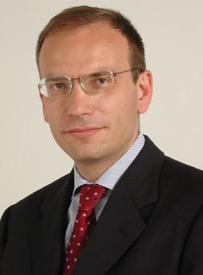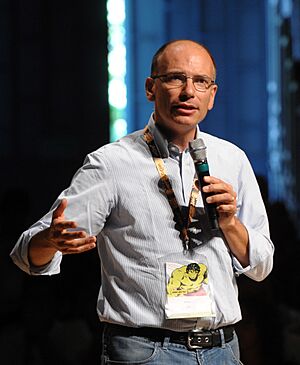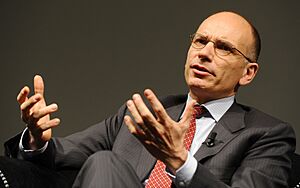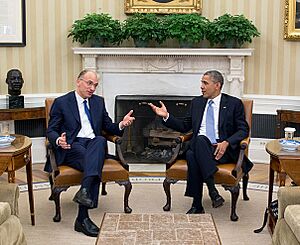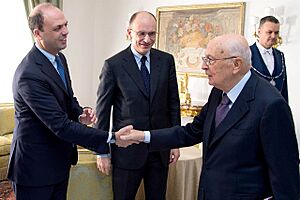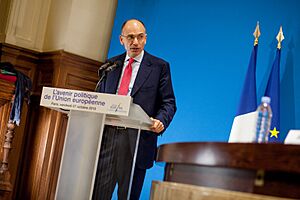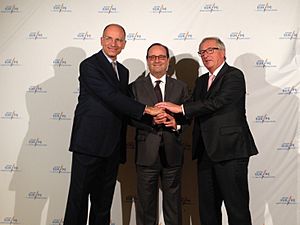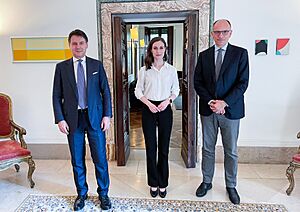Enrico Letta facts for kids
Quick facts for kids
Enrico Letta
|
|||||||||||||||||||||||||||||||||||
|---|---|---|---|---|---|---|---|---|---|---|---|---|---|---|---|---|---|---|---|---|---|---|---|---|---|---|---|---|---|---|---|---|---|---|---|
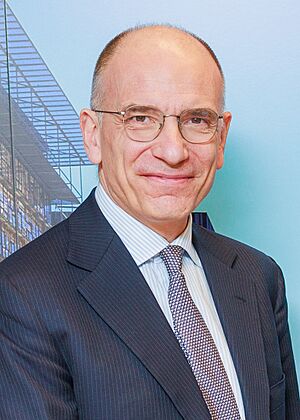
Letta in 2024
|
|||||||||||||||||||||||||||||||||||
| Prime Minister of Italy | |||||||||||||||||||||||||||||||||||
| In office 28 April 2013 – 22 February 2014 |
|||||||||||||||||||||||||||||||||||
| President | Giorgio Napolitano | ||||||||||||||||||||||||||||||||||
| Deputy | Angelino Alfano | ||||||||||||||||||||||||||||||||||
| Preceded by | Mario Monti | ||||||||||||||||||||||||||||||||||
| Succeeded by | Matteo Renzi | ||||||||||||||||||||||||||||||||||
| Secretary of the Democratic Party | |||||||||||||||||||||||||||||||||||
| In office 14 March 2021 – 12 March 2023 |
|||||||||||||||||||||||||||||||||||
| Deputy | Irene Tinagli Peppe Provenzano |
||||||||||||||||||||||||||||||||||
| Preceded by | Nicola Zingaretti | ||||||||||||||||||||||||||||||||||
| Succeeded by | Elly Schlein | ||||||||||||||||||||||||||||||||||
| Deputy Secretary of the Democratic Party | |||||||||||||||||||||||||||||||||||
| In office 7 November 2009 – 20 April 2013 |
|||||||||||||||||||||||||||||||||||
| Secretary | Pier Luigi Bersani | ||||||||||||||||||||||||||||||||||
| Preceded by | Dario Franceschini | ||||||||||||||||||||||||||||||||||
| Succeeded by | Debora Serracchiani Lorenzo Guerini |
||||||||||||||||||||||||||||||||||
|
|||||||||||||||||||||||||||||||||||
|
|||||||||||||||||||||||||||||||||||
| Personal details | |||||||||||||||||||||||||||||||||||
| Born | 20 August 1966 Pisa, Tuscany, Italy |
||||||||||||||||||||||||||||||||||
| Political party | PD (2007–2015; since 2019) | ||||||||||||||||||||||||||||||||||
| Other political affiliations |
DC (before 1994) PPI (1994–2002) DL (2002–2007) |
||||||||||||||||||||||||||||||||||
| Height | 1.87 m (6 ft 2 in) | ||||||||||||||||||||||||||||||||||
| Spouse | Gianna Fregonara | ||||||||||||||||||||||||||||||||||
| Children | 3 | ||||||||||||||||||||||||||||||||||
| Alma mater | University of Pisa Sant'Anna School of Advanced Studies |
||||||||||||||||||||||||||||||||||
| Profession |
|
||||||||||||||||||||||||||||||||||
| Signature | |||||||||||||||||||||||||||||||||||
Enrico Letta (born 20 August 1966) is an Italian politician. He served as the Prime Minister of Italy from April 2013 to February 2014. During this time, he led a special government made of different political parties. He was also the leader of the Democratic Party (PD) from March 2021 to March 2023.
Before becoming Prime Minister, Letta worked as a university professor. He started his political career in 1998. He became a minister, first for European policies, then for industry and trade. In 2001, he was elected to the Chamber of Deputies, which is like a part of Italy's parliament. From 2006 to 2008, he was a top advisor to the Prime Minister. In 2007, he helped create the Democratic Party and later became its Deputy Secretary.
After a difficult election in 2013, President Giorgio Napolitano asked Enrico Letta to form a special government. This government included parties from the left, right, and center. Its goal was to help Italy during a tough economic time. Letta became Prime Minister on 28 April 2013. His government worked to improve the economy and help young people find jobs. They also started a mission called Operation Mare Nostrum to rescue migrants in the Mediterranean Sea.
In November 2013, some political changes happened, but Letta managed to keep his government going. However, in December 2013, Matteo Renzi became the new leader of Letta's party. This caused some tension. Letta resigned as Prime Minister on 14 February 2014.
After leaving office, Letta moved to Paris to work as a dean at a university called Sciences Po. In March 2021, he returned to Italy to become the new leader of the Democratic Party. He was elected to the Chamber of Deputies again in October 2021. He resigned from parliament on 20 December 2024 to become a dean at IE University in Madrid, Spain.
Contents
Early Life and Education
Enrico Letta was born in Pisa, Tuscany, Italy. His father, Giorgio Letta, was a mathematics professor. His mother, Anna Banchi, had family from Tuscany and Sardinia. Enrico grew up in a large family. His uncle, Gianni Letta, was a close advisor to another important politician, Silvio Berlusconi.
Enrico spent some of his childhood in Strasbourg, France. He finished school in Pisa, Italy. He earned a degree in political science from the University of Pisa. He then got a PhD from the Sant'Anna School of Advanced Studies.
From 2001 to 2004, Letta taught at different universities. These included the University Carlo Cattaneo and HEC Paris.
Political Journey
Enrico Letta is Catholic and started his political career in the Christian Democracy party. This party was very important in Italy for nearly 50 years. From 1991 to 1995, he led the youth group of the European People's Party. He worked to connect different political parties across Europe. He has always been a strong supporter of the European Union.
In 1993 and 1994, Letta worked for the Minister of Foreign Affairs, Beniamino Andreatta. Andreatta was a big influence on Letta's political path.
After his first party ended in 1994, Letta joined the Italian People's Party. In 1998, at 32 years old, he became the Minister for the Community Policies. This made him the youngest cabinet minister in Italy after World War II.
In 1999, Letta became the Minister of Industry, Commerce and Crafts. He held this job until 2001.
In the 2001 Italian general election, Letta was elected to the Chamber of Deputies. He was part of a new centrist group called Democracy is Freedom – The Daisy.
In 2004, Letta was elected as a Member of the European Parliament. He received many votes and worked on economic issues. He also focused on relations with countries in North Africa.
In 2006, Letta was re-elected to the Chamber of Deputies. He became the Secretary of the Council of Ministers. This meant he was a very close advisor to Prime Minister Romano Prodi.
Becoming a Party Leader
In 2007, Letta helped create the Democratic Party (PD). He ran to become the party's first leader. He said the PD should be like Wikipedia, where everyone can contribute. His campaign was supported by many important politicians. However, Walter Veltroni won the election by a large margin.
After the election, Letta was put in charge of labor issues for the party. In 2008, he became the Shadow Minister of Labour.
Deputy Secretary of the Democratic Party
In 2009, Letta supported Pier Luigi Bersani for party leader. After Bersani won, Letta was appointed Deputy Secretary.
In 2010, Letta organized a meeting in Verona. He met with business owners and leaders from the Lega Nord party. This showed his interest in building connections across different political groups.
The 2013 Italian general election had no clear winner in the Senate. This led to a "hung parliament." On 20 April 2013, the leadership of the PD, including Letta, resigned. This happened after their candidates for President were not elected.
Prime Minister of Italy
Forming a Government
After the difficult election, President Giorgio Napolitano was re-elected. He then asked Enrico Letta to form a new government. This was on 24 April 2013.
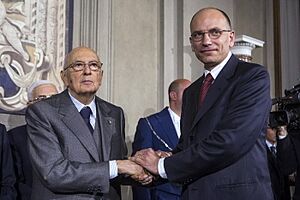
On 27 April, Letta agreed to lead a "grand coalition government." This government included his Democratic Party, The People of Freedom (a center-right party), and Civic Choice (a centrist party). It was the first time in Italy's history that all major parties from an election joined one government. Letta's uncle, Gianni Letta, was a close advisor to Silvio Berlusconi, which helped bridge the gap between opposing sides. Letta chose Angelino Alfano as his Deputy Prime Minister. The new government was sworn in on 28 April.
Letta's government quickly won votes of confidence in both the Chamber of Deputies and the Senate. In his first speech, he talked about the need for honesty and reducing political costs.
Economic Plans
As Prime Minister, Letta faced a big economic crisis. One major problem was high youth unemployment, which was around 40%. To help, Letta held a meeting with leaders from Germany, France, and Spain. They worked on common European plans to reduce unemployment. Italy later received 1.5 billion euros from the EU for this purpose.
Letta's government also worked to stop party subsidies, which meant political parties would no longer rely heavily on public money. This was a big change for Italian politics. They also approved a decree to help economic recovery and later abolished a property tax called IMU for primary homes.
Immigration Policies
Italy faced many migrants arriving from Libya and Syria in 2013.
On 3 October 2013, a boat carrying migrants sank near the Italian island of Lampedusa. Many people died in this tragedy. It was one of the deadliest shipwrecks in the Mediterranean Sea.
After this event, Prime Minister Letta started Operation Mare Nostrum. This was a military and humanitarian mission. Its goal was to patrol the sea and rescue migrants. It also aimed to stop illegal smuggling. This operation helped bring many migrants to Europe.
Foreign Relations
Letta was a strong supporter of Europe. He built good relationships with leaders like Angela Merkel from Germany and François Hollande from France. They agreed that more investment was needed to solve the economic crisis.
Letta attended the 39th G8 summit in Northern Ireland. There, he met U.S. President Barack Obama for the first time. Later, in October, Obama invited Letta to the White House.
Letta also took part in the 2013 G20 Saint Petersburg summit. He spoke about the Syrian civil war and asked for a peaceful solution. He also called for changes to the UN Security Council.
Government Challenges
On 28 September 2013, five ministers from The People of Freedom party resigned. Their leader, Silvio Berlusconi, ordered them to do so. This caused a government crisis. However, many members of Berlusconi's party decided to support Letta's government instead. On 2 October, the government won confidence votes in both the Senate and the Chamber of Deputies.
In November, the Senate voted to remove Berlusconi from Parliament due to a court ruling about his past business dealings. After this, Berlusconi withdrew his party's support for the government. But some ministers, led by Angelino Alfano, formed a new party called New Centre-Right. They continued to support Letta's government.
Resignation
In December 2013, Matteo Renzi became the new leader of the Democratic Party. This led to rumors that Renzi might try to become Prime Minister.
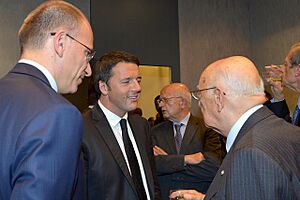
On 13 February 2014, the Democratic Party leadership voted for "a new government" and "radical reforms." This showed that Letta was losing support within his own party.
On 14 February, Enrico Letta resigned as Prime Minister. Matteo Renzi then became the new Prime Minister on 22 February.
Academic Career
In 2015, Letta resigned from the Chamber of Deputies. He then moved to Paris to teach at Sciences Po, a university focused on political science. He became the dean of the Paris School of International Affairs (PSIA) there. He also taught at other universities in Sydney and San Diego. In the same year, he started a "School of Politics" for young Italians.
In 2016, Letta supported a plan to change Italy's constitution. He also launched a school focused on European issues. In 2017, he joined a public commission in France to reform the government.
In March 2019, Letta rejoined the Democratic Party. He also advised several international organizations and companies. He is a member of many non-profit groups, including the Trilateral Commission.
Letta was appointed Dean of IE School of Politics, Economics and Global Affairs at IE University in Madrid. He started this role on November 20, 2024.
Secretary of the Democratic Party
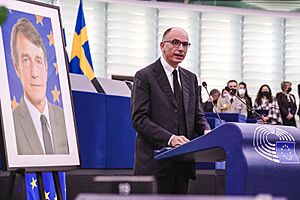
In January 2021, Italy faced a government crisis. The Prime Minister, Giuseppe Conte, resigned. A new government led by Mario Draghi was formed. The leader of the Democratic Party, Nicola Zingaretti, resigned in March 2021 due to internal party tensions.
Many important members of the Democratic Party asked Enrico Letta to become the new leader. After some thought, Letta accepted. On 14 March, the party's national assembly elected him as their new secretary.
On 17 March, Letta appointed Peppe Provenzano and Irene Tinagli as his deputy secretaries. He also appointed a new executive team with equal numbers of men and women. He encouraged the election of female leaders in Parliament.
In July 2021, Letta decided to run for the Chamber of Deputies again in the Siena area. On 4 October, he won the election and returned to Parliament after six years. The Democratic Party also won many local elections that year in major cities.
As a leader, Letta played a role in the 2022 Italian presidential election. He supported the re-election of President Sergio Mattarella. Mattarella was re-elected for a second term.
In July 2022, there were new tensions in the government. Giuseppe Conte's party withdrew support for Prime Minister Draghi. Letta was critical of this, saying Italy needed a strong leader like Draghi. However, Draghi resigned again on 21 July. A new election was called for 25 September 2022.
After the 2022 general election, Enrico Letta accepted his party's defeat. He announced that he would not run for party secretary again. Elly Schlein succeeded him as leader in February 2023.
Personal Life
Enrico Letta is married to Gianna Fregonara, who is a journalist. They have three children: Giacomo, Lorenzo, and Francesco.
Letta enjoys listening to the band Dire Straits and playing Subbuteo, a table football game. He is also a big fan of the A.C. Milan football team. Besides Italian, he speaks French, English, and Spanish very well.
Images for kids
See also
 In Spanish: Enrico Letta para niños
In Spanish: Enrico Letta para niños
 | Calvin Brent |
 | Walter T. Bailey |
 | Martha Cassell Thompson |
 | Alberta Jeannette Cassell |


